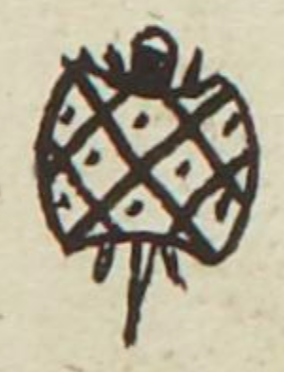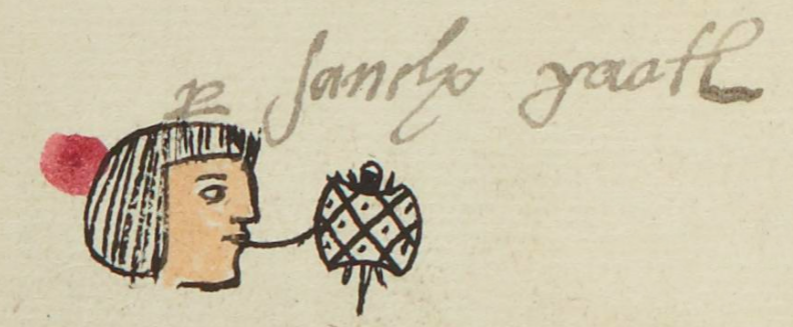Yaotl (MH514r)
This black-line drawing of the compound glyph for the personal name Yaotl ("The Combatant"), which is attested here as a man's name, consists of a frontal view of a war (yaoyotl) shield that double as a turtle's back. In a bird's eye view of the turtle (ayotl), the head, tail, and legs stick out from underneath the shield, with the head pointed upward. The pattern on the shield is a lattice-work pattern of diamond shapes with dots in the middle. The shape of the shield is similar to a European crest, but it also echoes the shape of a squash (ayotli) found in the Codex Mendoza on f. 46r. Indigenous shields were historically round with feathers coming off the bottom. The diamond patterns of the turtle shell are reminiscent of the some of the shields--those that have the X division. See also the work of Lisardo Pérez Lugones for a discussion of the turtle-shield.
Stephanie Wood
The ayotl is a phonetic complement for the desired reading of yaotl, which derives from the war shield. Perhaps the turtle is there to remind the viewer that the desired reading of the shield is not "chimalli" (the word for a war shield). The shield, however, can serve as an logogram for warfare (yaoyotl), close in sound to yaotl and derived from it. This combination of signs recurs in the Matrícula de Huexotzinco, athough there are some that are simply war shields without the turtle underneath. Ayotl and yaotl are near homophones.
Also worth noting is the pattern on this carapace. James Maffie (personal communication, 3/4/2025) reports: "Lois Martin...argues that the dotted diamond pattern so common on Maya depictions of turtle carapaces is identified by Sahagún as axochiatl ('water flower' or primrose). She argues that the dotted diamond lattice pattern refers to ripe maize. Irmgard Johnson and Diana Ryesky report that motifs consisting of small dotted diamonds are called maizitos on the mantas coloradas woven in Oaxaca. (203) Chantal Huckert identifies a similar pattern on contemporary Tlaxcalan embroidered blouses as 'representations of maize kernels and their dimples on the corn cob.' (203) When the kernels of maize ears begin to dimple, farmers know that the maize is sufficiently dry to be harvested and stored without spoilage. This condition is represented by the dots on the pates of the human-head maize ears depicted on the Templo Rojo mural of Cacaxtla, for example." [See: Lois Martin,“The Axochiatl Pattern: Aztec Science, Legitimacy, and Cross-Dressing,” in Visual Culture of the Ancient Americas: Contemporary Perspectives, Andrew Finegold and Ellen Hoobler (eds). Norman: University of Oklahoma Press, 2017, pp. 197-208.]
Stephanie Wood
Sancho yaotl
Sancho Yaotl
Stephanie Wood
1560
shields, crests, escudos, tortugas, nombres de hombres, feathers, plumas

yao(tl), enemy, combatant, https://nahuatl.wired-humanities.org/content/yaotl
yaoyo(tl), war, https://nahuatl.wired-humanities.org/content/yaoyotl
ayo(tl), turtle, https://nahuatl.wired-humanities.org/content/ayotl
El Combatiente
Matrícula de Huexotzinco, folio 514r, World Digital Library, https://www.loc.gov/resource/gdcwdl.wdl_15282/?sp=107&st=image
This manuscript is hosted by the Library of Congress and the World Digital Library; used here with the Creative Commons, “Attribution-NonCommercial-ShareAlike 3.0 License” (CC-BY-NC-SAq 3.0).









